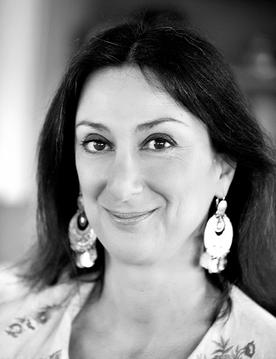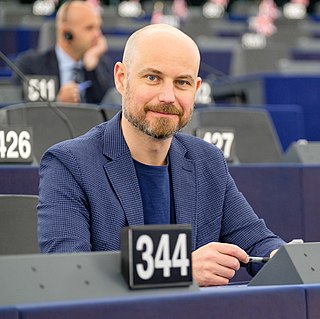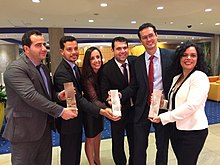
The Peter A. Allard School of Law is the law school of the University of British Columbia. The faculty offers the Juris Doctor (J.D.) degree. The faculty features courses on business law, tax law, environmental and natural resource law, indigenous law, Pacific Rim issues, and feminist legal theory.

David Casa is a Maltese politician and Member of the European Parliament. He is Malta's longest serving MEP, having served since June 2004. As a member of the Nationalist Party in Malta, he belongs to the European People's Party.

Joseph Muscat is a Maltese politician who served as the 13th prime minister of Malta from 2013 to 2020 and leader of the Labour Party from 2008 to 2020.
Rafael Marques de Morais is an Angolan journalist and anti-corruption activist who received several international awards for his reporting on conflict diamonds and government corruption in Angola. He currently heads the anti-corruption watchdog Maka Angola.

Bidnija is a rural hamlet between Mosta, St. Paul's Bay and Mġarr. It is located in the northern region of Malta and is home to roughly 308 people as of 2008, the second least populated habitable zone on the Maltese islands after Mdina. It is located between two main valleys then extends into other small valleys surrounding the area. It is largely a rural village surrounded by fields mainly belong to the inhabitants, although over the years other Maltese and foreigners have settled in the area generally for its countryside views.
Mishcon de Reya LLP is a British law firm with offices in London and Singapore. Founded in 1937, it employs more than 1200 people with over 600 lawyers. It is regarded as forming part of the "Silver Circle" of leading UK law firms.
The Conscience-in-Media Award is presented by the American Society of Journalists and Authors (ASJA) to journalists that the society deems worthy of recognition for their distinctive contributions. The award is not given out often, and is awarded to those journalists which the ASJA feels have demonstrated integrity to journalistic values, while enduring personal costs to themselves. Candidates are decided by an initial vote of the ASJA's First Amendment Committee, which must then be confirmed by a separate vote of the ASJA's board of directors.
Founded in 1921, English PEN is one of the world's first non-governmental organisations and among the first international bodies advocating for human rights. English PEN was the founding centre of PEN International, a worldwide writers' association with 145 centres in more than 100 countries. The President of English PEN is Margaret Busby, succeeding Philippe Sands in April 2023. The Director is Daniel Gorman. The Chair is Ruth Borthwick.
The International Consortium of Investigative Journalists, Inc. (ICIJ), is an independent global network of 280 investigative journalists and over 140 media organizations spanning more than 100 countries. It is based in Washington, D.C., with personnel in Australia, France, Spain, Hungary, Serbia, Belgium and Ireland.
Indonesia Corruption Watch (ICW) is an Indonesian NGO whose primary mission is to monitor and publicise incidents of corruption in Indonesia. ICW is also heavily engaged in the prevention and deterrence of corruption through education, cultural change, prosecutions and system reform. The organization was formed in Jakarta in June 1998 to prevent corruption in post-Suharto governments.
Events in the year 2017 in Malta.

Daphne Anne Caruana Galizia was a Maltese writer, journalist, blogger and anti-corruption activist, who reported on political events in Malta. In particular, she focused on investigative journalism, reporting on government corruption, nepotism, patronage, and allegations of money laundering, links between Malta's online gambling industry and organized crime, Malta's citizenship-by-investment scheme, and payments from the government of Azerbaijan. Caruana Galizia's national and international reputation was built on her regular reporting of misconduct by Maltese politicians and politically exposed persons.

The Great Siege Monument, also known as the Monument to the Fallen of the Great Siege, is a monument commemorating the Great Siege of Malta located in Valletta, Malta. It consists of three bronze figures symbolizing Faith, Fortitude, and Civilization, standing on top of a granite base. The monument is the work of the sculptor Antonio Sciortino, and it was inaugurated on 8 May 1927.
The Daphne Project is a collaborative, cross-border investigative journalism project by major news organizations from around the world, coordinated by Paris-based investigative non-profit newsroom, Forbidden Stories, to continue the work of Maltese investigative journalist Daphne Caruana Galizia. Their work has been facilitated through the Organized Crime and Corruption Reporting Project (OCCRP), a member of Global Investigative Journalism Network. They published their first in a series of reports in April 2018.

Vladimír Bilčík is a Slovak university lecturer and politician of the Slovak party Democrats. He has been serving as a Member of the European Parliament since 2019.
Yorgen Fenech is a Maltese businessman whose main interests are casinos and hotels in Malta. He was head of the Tumas Group and director of the Maltese-Azerbaijan-German company ElectroGas Malta.

A political and institutional crisis within the Republic of Malta followed the uncovering of alleged links between government officials and the 2017 assassination of investigative journalist Daphne Caruana Galizia. The Prime Minister's Chief of Staff Keith Schembri and Minister for Tourism Konrad Mizzi resigned following the arrest of businessman Yorgen Fenech in connection with the murder.

The 2019–2020 Maltese protests started in Valletta and other urban centres of Malta on 20 November 2019, mainly calling for resignations after alleged political links to the assassination of journalist and blogger Daphne Caruana Galizia surfaced following the arrest of businessman Yorgen Fenech. The protesters also targeted government corruption and the lack of action on money laundering. The protests consisted of demonstrations, marches, sit-ins, and civil disobedience and have been unprecedented in Malta's political history since its independence from the United Kingdom.
Forbidden Stories is a non-profit organization with the mission "to continue and publish the work of other journalists facing threats, prison, or murder." To achieve this, it allows journalists to send their work to Forbidden Stories, so other journalists have access to the material in case the original investigator is not able to follow it anymore. It partners with organizations such as Reporters Without Borders and Freedom of the Press Foundation.
Justice for Journalists Foundation is a non-governmental organization whose mission is to fight impunity for attacks against media. Based in London, its main goal is to protect journalists from the abuse of their right to freedom of expression, increase public awareness about attacks on media workers and provide journalists with the knowledge and skills necessary to protect themselves from professional risks.






















